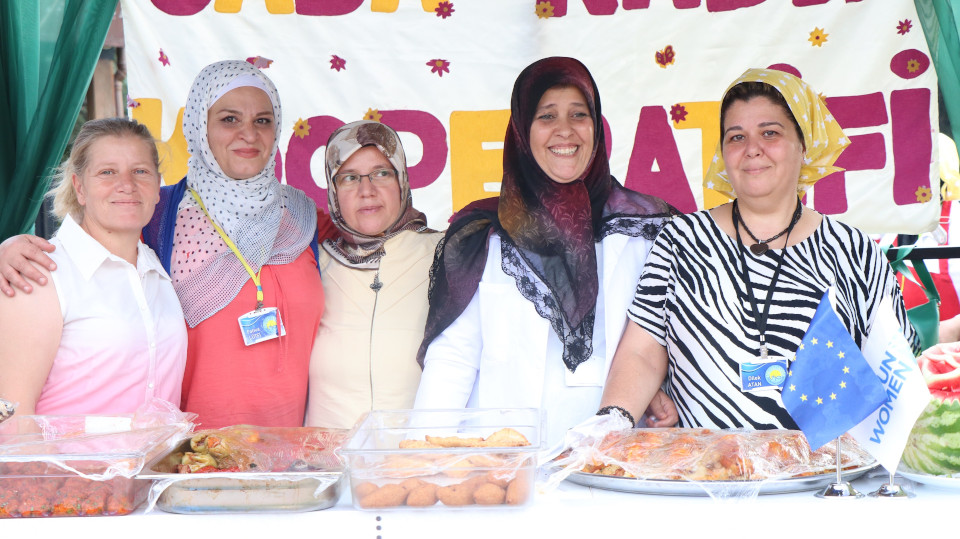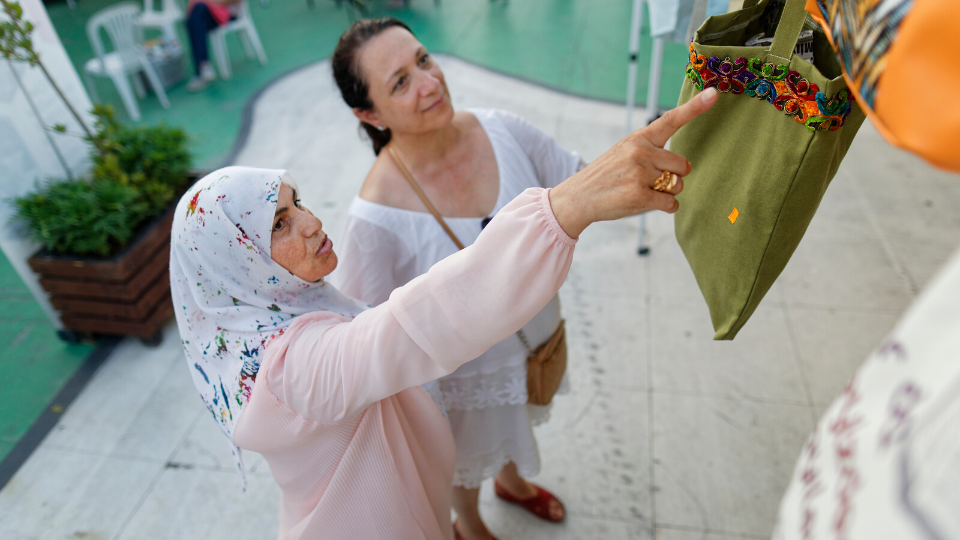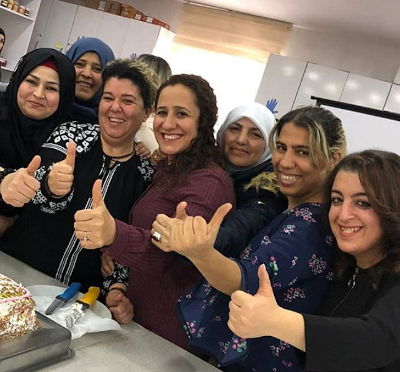Selma Faki and Safiye Mustafa: “Solidarity makes us shine together”
Selma Faki and Safiye Mustafa are members of the SADA Women’s Cooperative set up by Turkish, Syrian and Afghan women in Gaziantep, a province in Turkey near the Syrian border. The city hosts more than 450,000 Syrians who fled the war. Safiye Mustafa, 55, is a Syrian refugee and Selma Faki, 34, is a local of Gaziantep. The Cooperative became their gateway to social and economic freedom, enabling them to heal, learn, form bonds and friendships, produce and co-create. The Cooperative is filled with the life-stories of women who come from different backgrounds and cultures. Many of them succeeded and built new lives from the ashes of a tragic war. But most importantly, most women shined through women’s solidarity. During COVID-19 they used their digital skills to continue promoting their products. Now, they want to expand and deliver their products to places “they’ve never heard of”.
Date:

First it was hard then it got easier
Safiye: I am Safiye. I am Syrian and live with my four children and three grandchildren. When I was in Syria, I owned a shoemaking atelier, which my husband had opened for me. I was lucky as I had a husband who allowed me to work. I was more openminded than many other people in my town. I was encouraging economically vulnerable women to come and work with me. Over the years, all these women became masters of shoemaking. I wonder what they are doing now. If they are alive or not, in Syria or elsewhere… It is sad. I left Syria with my husband and children around eight years ago and found refuge in Gaziantep. My husband then left us. It was hard for me to stand on my own feet and take care of my children. It exhausted me psychologically.
One day I heard that there was a place called SADA Women’s Empowerment and Solidarity Center where they taught computer operating to young women. I went there with my daughter to enroll her in one of these classes. Then, I saw that Turkish and refugee women of all ages were there. As my profession back in Syria was shoemaking, the social workers at the Center informed me that I could take part in their shoe and bag making workshop. I joined.
Going out as a single woman
Selma: My name is Selma. I am Turkish and living with my parents. Before coming to the SADA Center, I had huge prejudices about Syrians. I thought they were just a burden on the shoulders of Turkey. Syrians also had many prejudices against us. During the first weeks of the classes, Syrian women were questioning me about how I could go out freely as I was a single woman. I struggled to understand how they were thinking, what their perceptions were. But all-in-all, we found a way out, became very good friends and created solidarity among us.
Solidarity healed me

Safiye: War is horrible. You never know if you will be alive after five minutes. You never know when you will lose another loved one. SADA healed me. At SADA we were all together as Syrian, Turkish and Afghan women. We opened our minds and hearts to each other. Some of us simply did not have a life to live. SADA created a purpose for us, a reason to wake up and go to sleep again, a reason to wait for the weekends. We were producing together. We produced and professionalized so much that we started to receive training in marketing and management. Then the rest came.
SADA put wings on me, the Cooperative made me fly
Selma: Together with our Syrian and Afghan friends we joined forces and set up SADA Women’s Cooperative in March 2019. The Cooperative is democratically run by all of us. We don’t have a manager, but are all managers. Currently, we are active in shoe-leather bag production, catering, and home textiles. We produce items like personal computer cases, cloth bags, make-up cases, and leather bags. We also use traditional Turkish and Syrian fabrics for the bags, table covers, scarves, and home textile products. We have been learning and making great efforts to produce quality products. Now, it is time for us to give a boost to our work and make a living from that.
Safiye: Imagine that I barely had a life to live before SADA. Now I am a member of a Cooperative, which provides a secure space for us to collectively produce. SADA put wings on me, the Cooperative made me fly. The Cooperative is something very important in our lives. Since March 2019, as 50 women from different cultures, we are making huge efforts to become more professional. Our efforts have also been heard at the international level.
From war to Paris

Selma: Only three months after the Cooperative was established, we were selected to present our work at the Paris Peace Forum. Two of our friends went to Paris and presented our work. Then we were selected as one of the 10 scale-up project out of 100, which means that our project has the potential to expand. This is what we always knew. Currently, we are locally known and receive orders from different customers. But we aim to reach out to the international market. We want our products to travel to places that we’ve never heard of.
Safiye: We believe in our potential. We are women who survived many horrible things that the war had brought to our lives. All that pain made us stronger and more resistant. Through solidarity we created at the Cooperative, we empowered each other. Now, we are attaching our stories to the items we produce. When the item is delivered to the customer, the customer can see whose hands were involved in making it.
These times would have been more difficult without solidarity
Selma: Time was flying when we were trying not to fall behind the orders. We were singing, dancing, learning and producing altogether. SADA didn’t only give us our profession and an income opportunity but it also gave us friendship. We never categorized each other as Turkish, Syrian or Afghan. We are all friends now no matter our languages, nationalities, beliefs or cultures. Now, time is like a turtle. Because of COVID-19, we are all at home. We also try to use this time as efficiently as possible for our Cooperative. We are managing our Instagram account and an e-commerce website is on the way. We have chat groups where we keep an eye on each other. These difficult times would have been much more difficult without our solidarity and friendship. I would have felt much lonelier without the voice messages that I receive from my Syrian friends. Together we are stronger.
Safiye: As a person who witnessed the most horrible parts of the war, COVID-19 is much easier to cope with. You sit at home and you are safe. No one bombs your home, cuts your electricity or your water; no one kidnaps or kills you or your loved ones. Despite its economic impacts, I believe that COVID-19 will soon go away and we will go out of our homes as even stronger women and continue to make SADA our voice.
Hear the voice: SADA
Selma & Safiye: SADA means voice both in Turkish and Arabic. Together we are raising our voices so that we are no longer marginalized but rather at the heart of things. We trust our quality products; we trust our co-existence; we trust what we bring to people’s lives and we trust women’s solidarity. We want to stand on our own feet, run the Cooperative and makes profits. SADA Women’s Cooperative is our wings to fly.
The SADA Center is run by UN Women in partnership with Gaziantep Metropolitan Municipality, International Labour Organisation and the Association for Solidarity with Asylum Seekers and Migrants and is financed by the European Union and the Government of Japan.